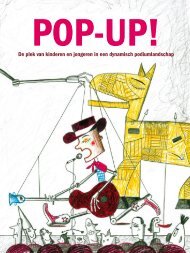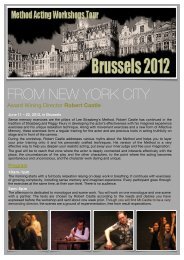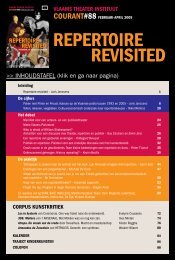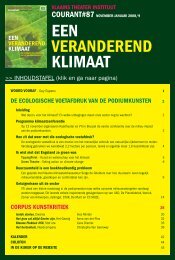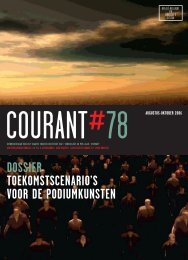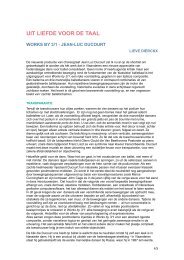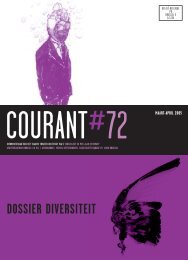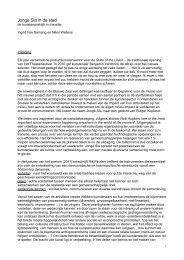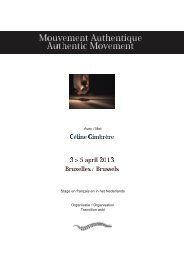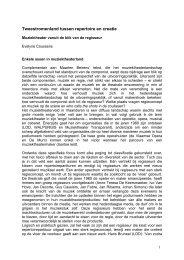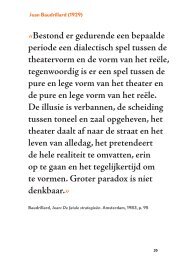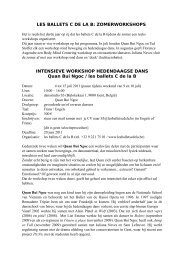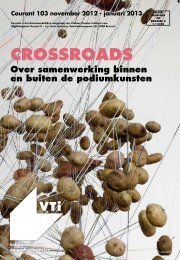music theatre in flanders - Muziekcentrum Vlaanderen
music theatre in flanders - Muziekcentrum Vlaanderen
music theatre in flanders - Muziekcentrum Vlaanderen
Create successful ePaper yourself
Turn your PDF publications into a flip-book with our unique Google optimized e-Paper software.
to handle productions on a scale no company could ever handle<br />
s<strong>in</strong>gle-handedly.<br />
SubSIdy STATuS<br />
Between 1993 and 2005 an ever <strong>in</strong>creas<strong>in</strong>g number of organizations<br />
became <strong>in</strong>volved <strong>in</strong> <strong>music</strong> <strong>theatre</strong> production. In 1993-1997,<br />
we count 125 different <strong>music</strong> <strong>theatre</strong> producers, <strong>in</strong> 1997-2001 this<br />
number has risen to 207 and <strong>in</strong> 2001-2005 their number <strong>in</strong>creases<br />
to 381: that is more than a threefold <strong>in</strong>crease compared to<br />
the first subsidy term. An ever <strong>in</strong>creas<strong>in</strong>g number of companies<br />
turned to <strong>music</strong> <strong>theatre</strong> production: the number of ma<strong>in</strong> producers<br />
doubles – from 64 <strong>in</strong> 1993-1997 to 128 <strong>in</strong> 2001-2005 – and the<br />
number of organizations that restrict themselves to co-produc<strong>in</strong>g<br />
or to giv<strong>in</strong>g co-production support rises even faster.<br />
A closer look at the <strong>music</strong> <strong>theatre</strong> producers’ backgrounds<br />
will shed more light on the motives beh<strong>in</strong>d this <strong>in</strong>creas<strong>in</strong>g cooperation.<br />
In the follow<strong>in</strong>g, we shall exam<strong>in</strong>e the land of orig<strong>in</strong><br />
and – for the Belgian organizations – the producers’ subsidy status.<br />
We shall work with four overall categories: ‘Perform<strong>in</strong>g Arts<br />
Decree’, ‘other public fund<strong>in</strong>g’, ‘foreign organizations’ and a rest<br />
category ‘non-subsidized Belgian organizations’, tak<strong>in</strong>g a closer<br />
look at some of them.<br />
perform<strong>in</strong>g Arts decree<br />
The ‘Perform<strong>in</strong>g Arts Decree’ category <strong>in</strong>cludes organizations<br />
that dur<strong>in</strong>g a certa<strong>in</strong> subsidy term made an appeal to structural<br />
or project support from the Flemish Government with<strong>in</strong> the<br />
framework of the Perform<strong>in</strong>g Arts Decree. To this group primarily<br />
belong organizations which received structural recognition. Dur<strong>in</strong>g<br />
the period 1993-1997 these were exclusively <strong>theatre</strong>, dance<br />
and <strong>music</strong> <strong>theatre</strong> organizations and arts centres. As of 1999, festivals<br />
were also <strong>in</strong>cluded. Arts laboratories were not recognized<br />
until 2006, with the <strong>in</strong>troduction of the Arts Decree.<br />
The decree granted project support to separate, <strong>in</strong>dividual productions,<br />
not to organizations. Still, we shall also <strong>in</strong>clude a ‘project<br />
companies’ sub-category, referr<strong>in</strong>g to organizations that at least<br />
once received a project grant dur<strong>in</strong>g a certa<strong>in</strong> subsidy term.<br />
Between 1993 and 2005 there was an <strong>in</strong> and out flux of organizations<br />
<strong>in</strong>to and out of the Perform<strong>in</strong>g Arts Decree. For that<br />
reason, we have avoided putt<strong>in</strong>g one s<strong>in</strong>gle label on an organization<br />
throughout the entire term. Instead, we reviewed the labels<br />
for each of the three subsidy terms, thus allow<strong>in</strong>g for ‘migration’<br />
of producers from one category to another dur<strong>in</strong>g the exam<strong>in</strong>ed<br />
period.<br />
As for the organizations that received subsidies <strong>in</strong> the capacity<br />
of ‘<strong>music</strong> <strong>theatre</strong>s’, it can generally be stated that dur<strong>in</strong>g the exam<strong>in</strong>ed<br />
period the ‘migration’ of project-based supported organizations<br />
to structurally supported organizations was very limited.<br />
There are, actually, only two cases. Opera Mobile received project<br />
subsidies <strong>in</strong> 1993-1997 and structural support <strong>in</strong> 1997-2001. The<br />
organization stopped its activities after 2001. Puppet-<strong>theatre</strong><br />
company De Spiegel – established <strong>in</strong> 1965 and, therefore, hardly a<br />
‘newcomer’ – received project subsidies <strong>in</strong> 1997-2001 and structural<br />
support <strong>in</strong> 2001-2005.<br />
Other public fund<strong>in</strong>g<br />
The ‘other public fund<strong>in</strong>g’ category <strong>in</strong>cludes organizations that do<br />
receive government support, but not with<strong>in</strong> the framework of the<br />
Perform<strong>in</strong>g Arts Decree. The first group <strong>in</strong>cludes organizations<br />
that received ‘ad nom<strong>in</strong>atim’ subsidies from the Flemish government<br />
culture budget. The most prom<strong>in</strong>ent example is, as far as<br />
<strong>music</strong> <strong>theatre</strong> is concerned, the Flemish Opera. Our category<br />
24 25<br />
table of contents



